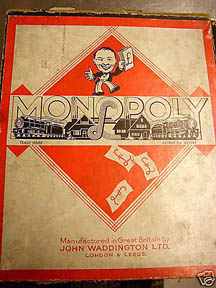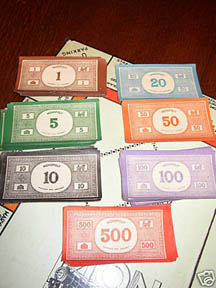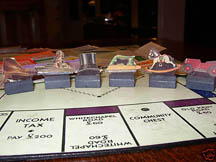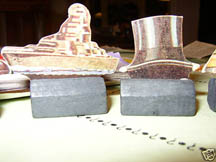more
than 500 million people have played the game!
|
His hands trembled as he split the box cardboard in the dim light from the tiny barred window above his head. He had already ravenously eaten the food that was left in the Red Cross Package and now found the strength to consider another escape attempt. A previous attempt had led to failure and severe punishment. Getting through the barbed wire had been relatively easy but finding his way through the snow and forests of Eastern Germany was not, nor was finding help or purchasing food or train tickets. He simply got lost until the patrols with dogs ran him down.
|
As he gently spread the layers of cardboard of the package, he found two slivers of metal which screwed together to form a file. He broke the little wooden red hotel to find a tiny silk map of his region folded very tightly. Under the packaged Monopoly money was real German Reich marks ready to spend and, finally, inside the Scotty dog was a tiny compass. Here was what he needed to be among the estimated 35,000 Allied POWs who escaped from German and Italian camps during WWII. The contraband in the Monopoly games is credited with at least one third of them During WWII, it is estimated that there were 135,000 British (50,000 from Dunkirk alone) and 95,532 US Prisoners of War held by Germany. By 1945 American and British POWs were mostly concentrated in about a dozen camps of several thousand each. Hitler, earlier, had decreed that all American and British prisoners were to be held at least 1000 miles from the English Channel. In order to make successful escapes as difficult as possible, Germans located the camps as far east as possible. As luck would have it, 'games and pastimes' was a category allowed into packages sent by the International Red Cross to prisoners of war. To help prisoners escape, in 1941, the British |
|
|
|
http://www.opsi.gov.uk/acts/acts1989/ukpga_19890006_en_1#l1g7 |
Since Monopoly was invented in 1934, an estimated more than 500 million people have played the game!
* More than 200 million MONOPOLY games have been sold worldwide.
* More than five billion little green houses have been "built"
since 1935.
* A MONOPOLY game made at Alfred Dunhill, with gold houses and silver
hotels, sold for $25,000.
* The longest MONOPOLY game in history lasted 70 straight days.
* The longest MONOPOLY game in a bathtub lasted 99 hours!
The game of MONOPOLY is so much a part of today's popular culture that the game's graphic elements have been trademarked. The MONOPOLY tokens, Railroad, COMMUNITY CHEST, CHANCE, and Title Deed designs, as well as BOARDWALK and all four game board corners are legally protected.
Bibliography
Bob Moore,& Kent Fedorowich eds., Prisoners of War and their Captors
in World War II, Berg Press, Oxford, UK, 1997.
David Rolf, Prisoners of the Reich, Germany's Captives, 1939-1945, 1998.
Winton, Andrew, Open Road to Faraway: Escapes from Nazi POW Camps 1941-1945. 2001. Cualann Press Ltd.
Nichol, John The Last Escape: The Untold Story of Allied Prisoners of War in Germany 1944-1945
Henry Chancellor - Colditz: The Definitive History
Arthur A. Durand - Stalag Luft III: The Secret Story
Anton Gill - The Great Escape: The Full Dramatic Story With Contributions from Survivors and Their Families
External links
The National Archives ADM 103 Prisoners of War 1755-1831
http://www.nationalarchives.gov.uk/catalogue/DisplayCatalogueDetails.asp?CATID=206&CATLN=3&FullDetails=False&j=1
http://www.nationalarchives.gov.uk/catalogue/RdLeaflet.asp?sLeafletID=303
www.mentalfloss.com
http://www.boingboing.net
http://www.truthorfiction.com
http://www.associatedcontent.com/
http://tfsternsrantings.blogspot.com
http://www.scarsdaleschools.org
http://forums.military.com
http://andrewsullivan.theatlantic.com/
http://www.sichat.com/
http://www.mentalfloss.com/http://www.aiipowmia.com/
http://www.hasbro.com/
http://www.mapforum.com/
Special thanks for the images to "MR FOMOCO MOTORCRAFT"
who had the 1941 version on sale on eBay
* The Rest of the Story is made famous by Paul Harvey who's stories
have intrigued and inspired me for years.
|
Visitors since
June 6, 2000 |



